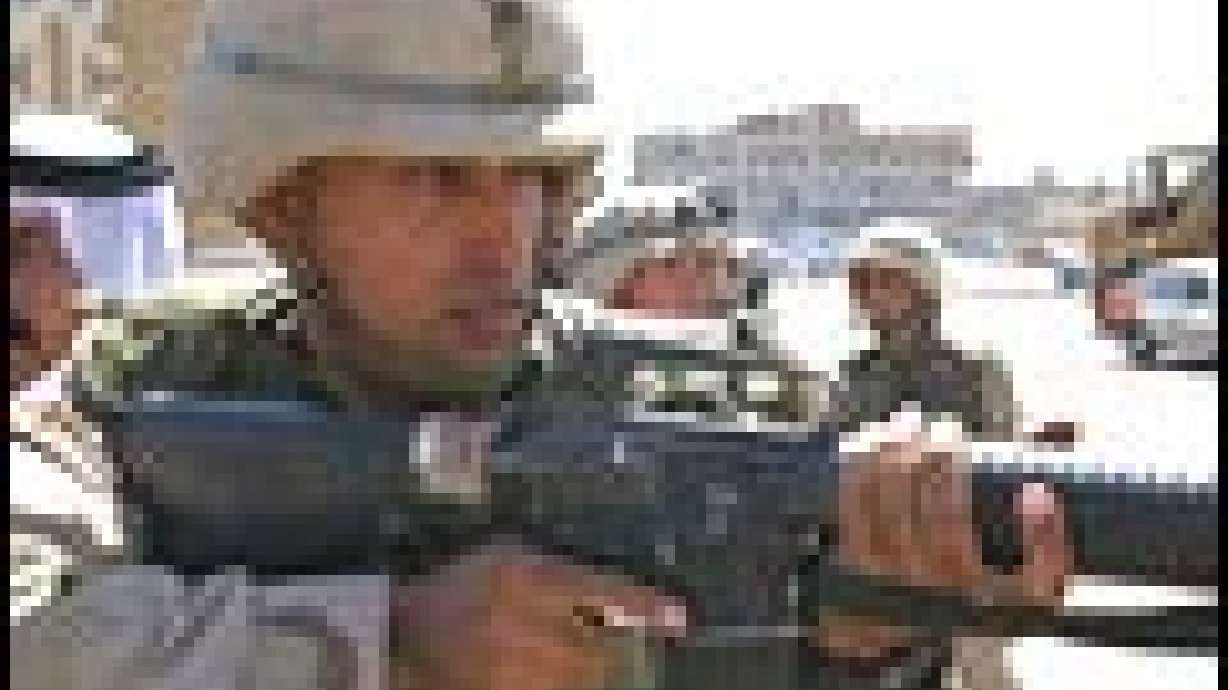Estimated read time: 3-4 minutes
This archived news story is available only for your personal, non-commercial use. Information in the story may be outdated or superseded by additional information. Reading or replaying the story in its archived form does not constitute a republication of the story.
BAGHDAD, Iraq (AP) -- Military commanders are calling on America's battle-hardened 3rd Infantry Division, which led the assault on Baghdad, to put down attacks by apparent loyalists of Saddam Hussein's fallen regime in a troubled area west of the capital.
According to U.S. officers and military documents, the 3rd Infantry will move into the area around Fallujah, a deeply conservative city where the Americans are facing increasing hostility from Iraqis.
The division's 2nd Brigade Combat Team will relieve the 3rd Armored Cavalry Regiment, which has kept a small number of troops in Fallujah and nearby Habaniyah since U.S. forces took control of the area in mid-April, according to the division's orders and officers speaking on condition of anonymity.
The brigade's mission will be to remove supporters of Saddam's Baath Party and other militias opposed to U.S. occupation. The second part of the mission will be to help restore any damaged infrastructure.
The operation is expected to begin within the next 10 days.
The Baath Party still has strong support in Fallujah and Habaniyah. On May 27, Staff Sgt. Michael B. Quinn, 37, of Tampa, Fla., and Sgt. Thomas F. Broomhead, 34, of Fort Carson, Colo., were killed when two Iraqis opened fire at a checkpoint in Fallujah.
The attackers were killed and nine other 3rd Armored Cavalry soldiers were wounded in the firefight.
Since a series of confrontations with U.S. forces in late April killed 18 Iraqis and wounded at least 78, anger at the Americans has intensified in Fallujah, a city of 200,000 some 30 miles west of the capital. Residents accuse U.S. troops of using excessive force and of not respecting Islamic practices.
The cavalry regiment is stretched across a swath of western Iraq, patrolling six major cities, three border crossings, a dam and highways. The incoming brigade is slightly larger than the regiment and will concentrate on the two cities, allowing the regiment to focus on other areas.
The 2nd Brigade -- with more than 1,500 combat soldiers, 88 Abrams tanks, 44 Bradley Fighting Vehicles and dozens of other vehicles -- will saturate the area with checkpoints.
Officers, speaking on condition of anonymity, said the troops would be ready for combat or to help rehabilitate schools, hospitals and other public services, depending on what kind of reception they receive.
The brigade was the first unit to occupy parts of Baghdad on April 7 and was involved in some of the most intense fighting of the war.
Senior commanders said the brigade was chosen for this operation because of its battle reputation within Iraq.
The brigade's equipment, though, suffered extensive wear and tear during the fighting and the buildup to the war in Iraq. The brigade's logisticians have scrambled to get spare parts and repair the unit's tanks and Bradley Fighting Vehicles prior to the operation.
Col. David Teeples, commander of the Fort Carson, Colo.-based cavalry regiment, told The Gazette of Colorado Springs on Sunday that some of his troops would be shifted temporarily from Fallujah to other areas to provide security.
"It is very likely we will reoccupy that battle space," he said.
Lt. Brian Crowley, medical planner for the cavalry regiment's 2nd Squadron, told the newspaper his unit is glad to see the relief troops coming. He said his unit would be able to "sit back, collect itself and fix what's broken."
Attacks have been staged against the regiment's convoys, traffic checkpoints and headquarters.
The attacks often involve more than one person, Teeples said, but he doesn't think a single group is behind all of them. He said he believes Baath Party loyalists give money and weapons to unemployed young men.
Teeples said the regiment is taking steps to prevent the attacks by identifying Baath Party officials, adding firepower to its convoys and treating every activity as a combat mission.
"We will make it very hard on communities that house some of these attackers," Teeples said.
(Copyright 2003 by The Associated Press. All Rights Reserved.)









